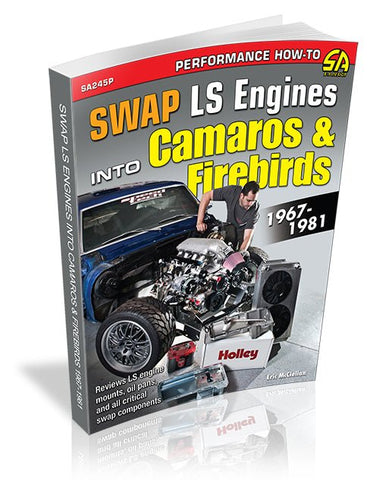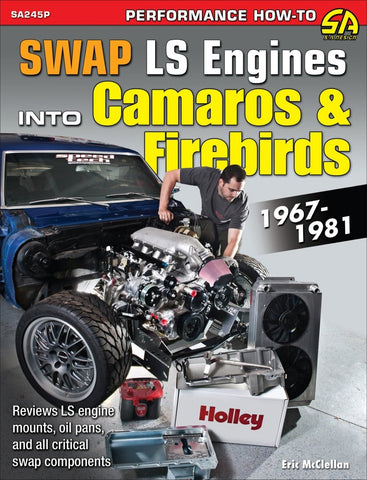The 1967-1981 Camaros and Firebirds are enduring classics that include the Z28, Firebird Formula 400, and the Smokey and the Bandit edition Trans Ams. But many owners want their rides to have the latest and greatest in GM engine technology and performance, and that's the LS engine. These F-Body cars readily accept these compact, lightweight modern V-8 engines. The LS engines produce more horsepower per cubic inch than almost all other pushrod V-8 engines, so the combination of the LS engine and a Camaro or Firebird make for an extraordinary performance car. And that's precisely why these engine swaps have become so popular.
To perform a professional caliber LS engine swap into a Camaro or Firebird, you need proper planning, the right combination of parts, and information to complete the project. Swap LS Engines into Camaros & Firebirds: 1967-1981 provides excellent instruction and guidance for selecting the best engine for a budget, choosing the adapter plates and engine mounts, dropping the engine into the car, selecting the ideal transmission and drivelines, and completing all facets of the swap. You need to ensure that all the other components on the car are compatible with the engine, so author McClellan instructs readers how to integrate the electronic engine control system on the early F-Body cars as well as select and install exhaust, intake, fuel pumps, and upgrade cooling system for the high-performance LS.
While the swapping process is covered in detail, the author also provides a helpful Gen III and Gen IV LS engine guide, so the reader finds the best performing and reliable engine suited for a particular car and application, such as Pro Touring, drag racing, and high-performance street. In addition, the author explains how to shop for and buy a used LS engine from a salvage yard, so you get a good engine with all required accessories. When you are ready to swap a stock powerplant engine for a GM LS, you are going to need this book.
Acknowledgments
Foreword by Steven Rupp
Introduction
Chapter 1:
Choosing an LS Engine
Selection Process
GM LS Engine Architecture
Gen III Engines
Gen IV Engines
Gen IV Vortec Engines
Chevrolet Performance Engines
Other LS Engine Builders
Sourcing from a Junkyard or Salvage Yard
Sample Junkyard Pull and Buildup: A Turbo 5.3L
Chapter 2:
Engine and Subframe
Front Clip Sheet Metal
Stock Subframe
Engine Mounts
Oil Pans
Oil
Chapter 3:
Chassis and Suspension
Removing the Subframe
Front Suspension
Rear Suspension
Wheels
Tires
Installing Mini-Tubs
Brake Systems
Chapter 4:
Front-Drive Accessories
Camaro, Corvette, Truck and GM Kits
Balancers and Dampeners
Aftermarket Options
Helpful Hints
Chapter 5:
Fuel System
Proper Planning
Fuel Pump
Filter
Hose and Fittings
Stock Fuel Tank Replacement
Tank Replacement Sources
AN Line Fabrication
Gas Pedal
Chapter 6:
Cooling System
Radiator
Radiator Hose Location
Coolant Steam Line
Heater Outlets
Coolant Temperature Sensor
Electric Fan
PCV System
Chapter 7:
Transmission
T56 Install
New-Style Transmissions
Classic Transmissions
Crossmembers
Bellhousing
Chapter 8:
Wiring
Gauges
Wiring Harness
Adapting an LSX Wiring Harness
ECM Calibration
Chapter 9:
Exhaust and Induction
Headers
Oxygen Sensors
Catalytic Converters
Induction
Chapter 10:
Initial Start-Up
Systems Checks
Leaks
Nut and Bolt the Car
Engine Break-In: First Firing and Test-Drive
Source Guide
The 1967-1981 Camaros and Firebirds are enduring classics that include the Z28, Firebird Formula 400, and the Smokey and the Bandit edition Trans Ams. But many owners want their rides to have the latest and greatest in GM engine technology and performance, and that's the LS engine. These F-Body cars readily accept these compact, lightweight modern V-8 engines. The LS engines produce more horsepower per cubic inch than almost all other pushrod V-8 engines, so the combination of the LS engine and a Camaro or Firebird make for an extraordinary performance car. And that's precisely why these engine swaps have become so popular.
To perform a professional caliber LS engine swap into a Camaro or Firebird, you need proper planning, the right combination of parts, and information to complete the project. Swap LS Engines into Camaros & Firebirds: 1967-1981 provides excellent instruction and guidance for selecting the best engine for a budget, choosing the adapter plates and engine mounts, dropping the engine into the car, selecting the ideal transmission and drivelines, and completing all facets of the swap. You need to ensure that all the other components on the car are compatible with the engine, so author McClellan instructs readers how to integrate the electronic engine control system on the early F-Body cars as well as select and install exhaust, intake, fuel pumps, and upgrade cooling system for the high-performance LS.
While the swapping process is covered in detail, the author also provides a helpful Gen III and Gen IV LS engine guide, so the reader finds the best performing and reliable engine suited for a particular car and application, such as Pro Touring, drag racing, and high-performance street. In addition, the author explains how to shop for and buy a used LS engine from a salvage yard, so you get a good engine with all required accessories. When you are ready to swap a stock powerplant engine for a GM LS, you are going to need this book.
Acknowledgments
Foreword by Steven Rupp
Introduction
Chapter 1:
Choosing an LS Engine
Selection Process
GM LS Engine Architecture
Gen III Engines
Gen IV Engines
Gen IV Vortec Engines
Chevrolet Performance Engines
Other LS Engine Builders
Sourcing from a Junkyard or Salvage Yard
Sample Junkyard Pull and Buildup: A Turbo 5.3L
Chapter 2:
Engine and Subframe
Front Clip Sheet Metal
Stock Subframe
Engine Mounts
Oil Pans
Oil
Chapter 3:
Chassis and Suspension
Removing the Subframe
Front Suspension
Rear Suspension
Wheels
Tires
Installing Mini-Tubs
Brake Systems
Chapter 4:
Front-Drive Accessories
Camaro, Corvette, Truck and GM Kits
Balancers and Dampeners
Aftermarket Options
Helpful Hints
Chapter 5:
Fuel System
Proper Planning
Fuel Pump
Filter
Hose and Fittings
Stock Fuel Tank Replacement
Tank Replacement Sources
AN Line Fabrication
Gas Pedal
Chapter 6:
Cooling System
Radiator
Radiator Hose Location
Coolant Steam Line
Heater Outlets
Coolant Temperature Sensor
Electric Fan
PCV System
Chapter 7:
Transmission
T56 Install
New-Style Transmissions
Classic Transmissions
Crossmembers
Bellhousing
Chapter 8:
Wiring
Gauges
Wiring Harness
Adapting an LSX Wiring Harness
ECM Calibration
Chapter 9:
Exhaust and Induction
Headers
Oxygen Sensors
Catalytic Converters
Induction
Chapter 10:
Initial Start-Up
Systems Checks
Leaks
Nut and Bolt the Car
Engine Break-In: First Firing and Test-Drive
Source Guide










